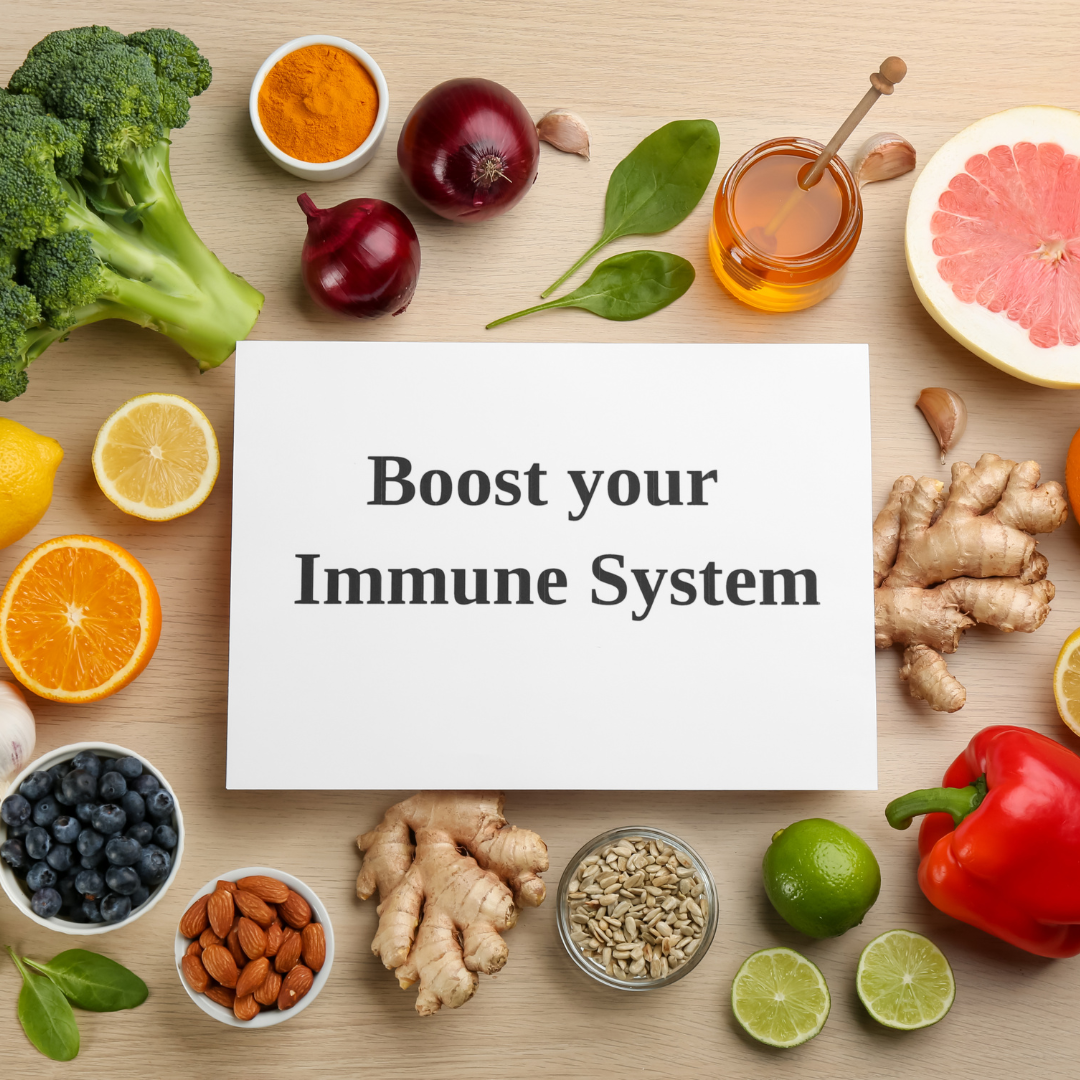Boosting Immunity with Seasonal Foods: A Guide for the European Winter
As winter continues, maintaining a strong immune system is more important than ever and this blog explores how the power of seasonal foods can help bolster your immunity and keep you healthy during the colder months.
Challenges to Immune Health in Winter
- In winter, shorter days and less sunlight can lead to lower levels of Vitamin D in our bodies. Vitamin D plays a crucial role in immune function, helping to activate T cells that detect and destroy pathogens. A deficiency in Vitamin D can weaken the immune response.
- Cold weather often drives people indoors, where they are more likely to be in close contact with others. This close proximity increases the likelihood of spreading viruses, like the common cold and flu.
- Drier indoor air may dry out mucous membranes and reduce their effectiveness in trapping and eliminating microbes.
- Research suggests that our immune system may undergo seasonal changes. Scientists have found out that cold air impairs the immune response in the nose. A small temperature drop in the nose (around 5 degrees Celsius) can kill about 50% of the immune cells and viruses that protect us. Exposure to cold air can decrease the nose’s temperature, leading to a reduction in the effectiveness of immune mechanisms.
- Dietary Changes in winter, might bring about less consumption of fresh fruits and vegetables, which are vital sources of vitamins, minerals, and antioxidants that support immune function and more .processed and high-calorie foods, which can negatively impact immune health.
- Winter mayalso bring about increased stress levels and a reduction in physical activity which contribute to lowered immunity.
- Winter months often coincide with holiday seasons, leading to more social gatherings. These events can increase the risk of exposure to viruses and other pathogens.
The Role of Nutrition in Immune Function
Certain nutrients are fundamental in supporting and enhancing our immune system.
- Vitamin C aids in the production of white blood cells, which are key to fighting infections. Common sources include citrus fruits, strawberries, bell peppers, and spinach.
- Vitamin D is crucial for activating immune defenses, and deficiency in this vitamin increases susceptibility to infection. Sources include sunlight exposure, fortified foods, and supplements.
- Zinc is vital for immune cell development and communication and plays a role in inflammatory response.Sources include lean meat, poultry, seafood, milk, whole grain products, beans, seeds, and nuts.
- Selenium influences inflammation and immune response and prevents cell damage. Foods rich in selenium include Brazil nuts, fish, sunflower seeds, and eggs.
- Iron helps carry oxygen to cells. Red meat, chicken, fish, legumes, and fortified foods are good sources.
- Adequate protein intake is vital for immune response. Sources of protein-rich foods include animal and plant-based sources like meat, fish, dairy products, nuts, and beans.
- Antioxidants combat free radicals, which can cause inflammation. Foods rich in antioxidants include berries, dark chocolate, artichokes, and pecans.
- Omega-3 Fatty Acids are essential fats with anti-inflammatory properties and sources include fatty fish, chia seeds, flaxseeds, and walnuts.
- Fibre is beneficial for digestive health and a healthy gut microbiome. A healthy gut microbiome is crucial for a strong immune system.
Nutritional Powerhouses of Winter Produce in Europe
1. The Virtues of Root Vegetables
Root vegetables like carrots, turnips, and beetroot thrive in colder weather, making them staple foods in winter. Carrots are high in beta-carotene, which the body converts into vitamin A, essential for vision, growth, and immune function. Turnips provide a good source of vitamin C, vital for immune health and skin integrity. Beetroot contains high levels of folate (vitamin B9) and manganese and for its antioxidant and anti-inflammatory properties which help reduce the risk of chronic diseases and support immune health.
2. The Power of Citrus
Vitamin C is an antioxidant found in citrus fruits and it helps protect cells from harmful free radicals, supports the immune system by enhancing the function of various immune cells, and improves the skin’s defense system.
Citrus fruits contain flavonoids which have anti-inflammatory and antioxidant properties, contributing to heart health and potentially reducing the risk of certain diseases, as well as dietary fibre. A high water content in citrus fruits also increases hydration during dry, cold months.
3. The Strength of Greens
Leafy greens like kale, chard, and spinach are powerhouses of nutrition, packed with vitamins and minerals critical for health and immunity. These greens are some of the best sources of vitamins A, C, and K. Vitamin A supports immune function and skin health, Vitamin C is crucial for immune defense, and Vitamin K plays a key role in blood clotting and bone health. Spinach and chard are excellent sources of magnesium and iron, essential for energy production and oxygen transport, respectively. Kale provides calcium, important for bone health and muscle function. Leafy greens contain antioxidants like lutein and beta-carotene, which protect against cell damage and phytonutrients, which can reduce inflammation and lower disease risk.
4. The Magic of Mushrooms
Mushrooms offer a wide range of health benefits particularly when it comes to the immune system as they are high in selenium, antioxidants and B vitamins.
A key feature of mushrooms is their content of beta-glucans, a type of polysaccharide that has been extensively studied for its immune-boosting properties. Beta-glucans help in activating immune system cells like macrophages and natural killer cells, which are essential for fighting off infections.
Incorporating a variety of mushrooms into the diet such as shiitake, maitake, reishi, and even the more common button mushrooms, can provide these immune-boosting benefits.
5. The support of herbs
Herbs like thyme, rosemary, and sage offer more than just flavour enhancement for meals; they have compounds that can support and enhance immune function. Thyme contains thymol, an essential oil with powerful antimicrobial properties against bacteria, fungi, and viruses. Incorporating thyme into your diet can help protect against microbial infections. Rosemary is rich in antioxidants, such as carnosic acid and rosmarinic acid, which help in neutralizing harmful free radicals in the body. These antioxidants can support the immune system by reducing inflammation and protecting cells from damage. It contains compounds like rosmarinic acid, which can help in reducing inflammation and supporting immune health. Remember, herbs can also be added to teas for a soothing way to enjoy their immune-supporting effects.
Other Lifestyle Tips for Supporting Immunity beyond diet
- Sleep, exercise, and stress management all contribute to immune health.
- Do not underestimate the importance of hydration during winter.
Watch out for easy to follow recipes for immune strength across all Miverbo platforms this month including nourishing soups and stews, invigorating warm salads and energising snacks! We will incorporate greens and root veggies into satisfying warm salads and suggest tasty snacks which reinforce immune health. Remember! No single food or nutrient can provide complete immunity. A holistic approach to diet and lifestyle is key.
Your Motivational Boost
In a recent podcast by Mel Robbins, an intriguing fact was shared: the 19th of January is often referred to as “Quitters’ Day.” It’s the day many of us find our New Year’s resolutions crumbling, as old habits resurface amidst challenges that seem overwhelming.
Remember that adopting a healthy and active lifestyle isn’t about quick fixes or temporary changes and that this is a continuous journey, not just a destination to be reached through a brief period of intense effort. If you’ve found yourself straying from your New Year’s resolutions, it’s not the end. It’s an opportunity to remind yourself that the pursuit of health is a daily commitment, not a fleeting phase.
Your brain remembers your past successes – the long stretches of time when you were on track. This memory can be a powerful ally in re-establishing healthy habits. If you’ve slipped, don’t dwell on it. Instead, leverage your previous experience to regain your momentum more quickly.
Remember, the pursuit of perfection can be a hindrance. It’s consistency that should be our goal. While often undervalued, consistency is the true key to long-term success in maintaining a healthy lifestyle. Every day is a new chance to reinforce those good habits, to get back on the wagon if you’ve fallen off, and to keep moving forward.
Lenten Love: The 8-week Journey to Self-Care

For those seeking expert advice and a motivational boost to address weight loss or management holistically, consider enrolling into our upcoming 8-week programme.
This programme starts on the 14th of February, a date that coincides with both Ash Wednesday and Valentine’s Day, providing a unique and meaningful start to your journey.
Wrap up
Embracing the seasonal produce available in Europe as well as harnessing the power of consistency, can be a delightful and effective way to support our health journey through the winter.
Cheers to a stronger, more resilient you, in both body and mind!
Corinne




